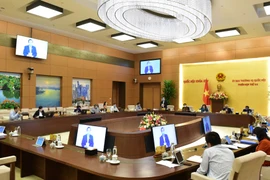Hanoi (VNA) – Joining the International LabourOrganisation (ILO)’s Abolition of Forced Labour Convention (Convention 105) is significantto Vietnam in political, economic,social and legal spheres, Vice President Dang Thi Ngoc Thinh said on May 20.
She made the remarks at the ongoing ninth session of the 14th legislature while presenting the StatePresident’s proposal to the National Assembly for ratifying the convention.
Adopted by the ILO on June 25, 1957, Convention 105 isone of the two ILO conventions against forced labour, along with Convention 29 whichVietnam joined in 2007.
With 10 chapters, it prescribes fundamental internationalregulations on the abolition of forced labour and ensuring labourers’ right tofree choice of profession and employment.
This is one of the human rights and basic rights ofcitizens stipulated in the 2013 Constitution, Thinh said, adding that theabolition of forced labour is not only the basic standard set by the ILO butalso the universal human rights standard mentioned in the UN InternationalCovenant on Civil and Political Rights (ICCPR).
The abolition of forced labour will help to buildharmonious labour relations, thus contributing to spurring socio-economicdevelopment, while making it easier for Vietnamese firms to access the globalmarket, especially the US and Europe, the Vice President stressed.
At the session, Minister of Labour, Invalids andSocial Affairs Dao Ngoc Dung presented the Prime Minister’s report elaboratingVietnam’s engagement in Convention 105.
He cited the Vietnamese legal system that bans forcedlabour in any forms and prescribes strict punishments against violations.
Vietnam’s joining the convention manifests its politicalcommitments to seriously fulfilling ILO membership obligations and othercommitments in new-generation free trade agreements, the minister said.
In his assessment report, Nguyen Van Giau, head of theNA’s Committee for External Relations, said most of the lawmakers agreed on the necessityof joining Convention 105 which, they said, is in accordance with guidelinesof the Party and the State.
They proposed the Government issue regulationsdetailing forms of forced labour, thus creating a transparent legal corridorfor law enforcement agencies, employees and employers to materialise theconvention./.




























